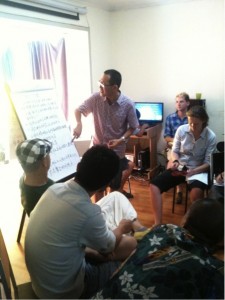Learning from Big Brothers: What Soviet and Central European Histories of Everyday Life May Teach Historians of the Mao Era
The British Inter-university China Centre (BICC) ‘Cultures of Consumption‘ network, supported by the Arts and Humanities Research Council (UK), will host the conference “Learning from Big Brothers” on 26-28 September 2013 in Oxford. Advance registration is mandatory and places limited.
The conference brings together Central European and Soviet historians of everyday life with Chinese historians who are starting to work on similar issues for the Mao era (1949-76). The conference will form the foundation for a network of scholars in China, the EU, and the US who are interested in consumerism and everyday life in non- and quasi-market economies since c.1945. Creating a dialog between scholars of European and Chinese history will ensure that Chinese historians take into account the range and depth of important work that has been done in the past decade on the experience of socialism in Central Europe and the USSR.
The first two panels will outline the conference agenda. The conference will open with a roundtable discussion led by East German historian Paul Betts, author of a recent article comparing consumerism across communist societies, and Steve Smith, the Oxford Handbook on the History of Communism, on the strengths and weaknesses of such social histories across national contexts. Their opening remarks will be followed by comments by two China scholars working on similarly comparative projects. And the second panel will discuss the new types of sources available and the types of histories now being written while attempting to answer the question: What are the methodological challenges of studying everyday life under socialism?
The subsequent five panels will provide explicit case studies, ranging from recently completed comparative studies by European historians to recently initiated projects by Chinese historians. Both sides will suggest how their findings might help shape the research agendas of the other geographical side. Frank Trentmann will discuss the challenges of comparing socialist and capitalist societies in his new book, The Consuming Passion: How Things Came to Seduce, Enrich, and Define our Lives. And Patrick Patterson will describe his comparative project on Eastern European consumerism with a talk entitled, “The Machinery of the Market in Communist Europe: What May Apply to Communist China?” The following three panels will consist of Chinese historians at the early stages of researching everyday life under Mao from home furnishing to shopping to diary-keeping, with brief presentations followed by comments by European historians who have already worked on similar topics.
The final panel will introduce large-scale projects underway. Eastern European historian Josie McLellan will speak on “How to Investigate Dropping Out of Chinese Socialism: Notes from the Central European Experience” and Sun Peidong will address “What Oral Histories Can Teach Us about the Everyday Life under Mao.”
For more information please contact the conference organiser: Dr Karl Gerth (Oxford University and UCSD)
PARTICIPANTS
CHINA
Jennifer Altehenger (King’s College London)
Felix Boecking (University of Edinburgh)
Feng Xiaocai (East China Normal University)
Karl Gerth, (University of California, San Diego)
Henrietta Harrison (Oxford University)
Jonathan Howlett (University of York)
Matthew Johnson (Grinnell College)
Toby Lincoln (University of Leicester)
Rana Mitter (Oxford University)
Aaron William Moore (Manchester University)
Paul Pickowicz (University of California, San Diego)
Sun Peidong (Fudan University)
Patricia Thornton (Oxford University)
CENTRAL EUROPE / SOVIET UNION
Paul Betts (Oxford University)
Natalya Chernyshova (University of Winchester)
Sebastian Gehrig
Josie McLellan (University of Bristol)
Pal NYIRI (University of Amsterdam)
Patrick Patterson (University of California, San Diego)
Steve Smith (Oxford University)
Frank Trentmann (University of London)

